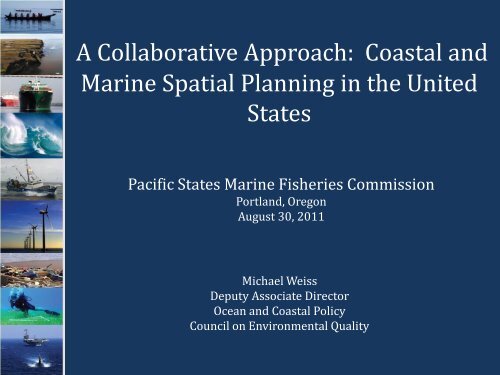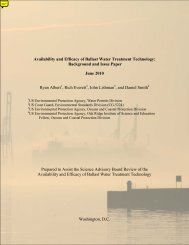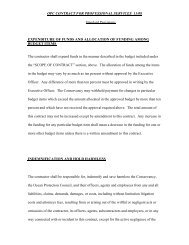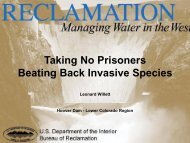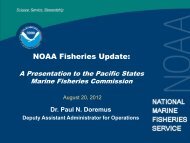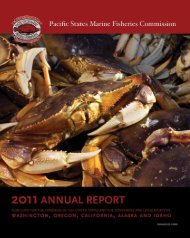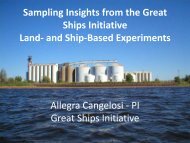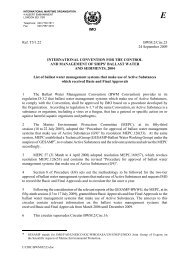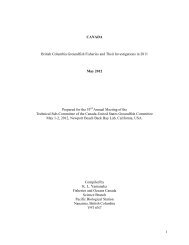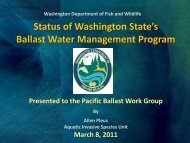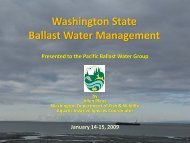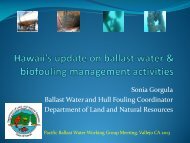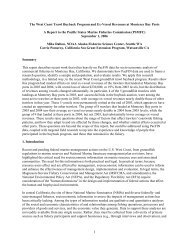National Ocean Council - Pacific States Marine Fisheries Commission
National Ocean Council - Pacific States Marine Fisheries Commission
National Ocean Council - Pacific States Marine Fisheries Commission
You also want an ePaper? Increase the reach of your titles
YUMPU automatically turns print PDFs into web optimized ePapers that Google loves.
A Collaborative Approach: Coastal and<br />
<strong>Marine</strong> Spatial Planning in the United<br />
<strong>States</strong><br />
<strong>Pacific</strong> <strong>States</strong> <strong>Marine</strong> <strong>Fisheries</strong> <strong>Commission</strong><br />
Portland, Oregon<br />
August 30, 2011<br />
Michael Weiss<br />
Deputy Associate Director<br />
<strong>Ocean</strong> and Coastal Policy<br />
<strong>Council</strong> on Environmental Quality
<strong>National</strong> <strong>Ocean</strong> Policy<br />
Executive Order 13547 established our Nation’s first<br />
ever <strong>National</strong> Policy for Stewardship of the <strong>Ocean</strong>, our<br />
Coasts, and the Great Lakes<br />
Vision:<br />
An America whose stewardship ensures that the<br />
ocean, our coasts, and the Great Lakes are<br />
healthy and resilient, safe and productive, and<br />
understood and treasured<br />
so as to promote the well-being, prosperity, and<br />
security of present and future generations.<br />
<strong>National</strong> <strong>Ocean</strong> <strong>Council</strong>
Targeted Implementation Strategy<br />
HOW WE DO<br />
BUSINESS<br />
Ecosystem-Based<br />
Management<br />
Coastal & <strong>Marine</strong><br />
Spatial Planning<br />
Inform Decisions &<br />
Improve Understanding<br />
Coordinate &<br />
Support<br />
9 Priority Objectives<br />
AREAS OF<br />
SPECIAL EMPHASIS<br />
Resiliency & Adaptation<br />
to Climate Change &<br />
<strong>Ocean</strong> Acidification<br />
Regional Ecosystem<br />
Protection & Restoration<br />
Water Quality &<br />
Sustainable Practices<br />
on Land<br />
Changing Conditions<br />
in the Arctic<br />
<strong>Ocean</strong>, Coastal, &<br />
Great Lakes Observation,<br />
Mapping & Infrastructure
Why do we need better planning?<br />
4
Coastal and <strong>Marine</strong> Spatial Planning Defined<br />
What it is:<br />
A regionally-based planning process for analyzing current<br />
and anticipated uses of ocean, coastal, and Great Lakes<br />
areas.<br />
What it does:<br />
Identifies areas most suitable for various types of<br />
activities in order to facilitate compatible uses, and<br />
preserve ecosystem services to meet our nation’s<br />
economic, environmental, security, and social goals.<br />
Provides a public policy process for society to better<br />
determine how the ocean, coasts, and Great Lakes are<br />
sustainably used and protected - now and for future<br />
generations.<br />
<strong>National</strong> <strong>Ocean</strong> <strong>Council</strong>
How is CMSP Different?<br />
• Comprehensive and integrated<br />
• All interested parties are at the table<br />
from the beginning<br />
• Long range planning independent of<br />
specific activity<br />
• Focused on region, not a specific<br />
location<br />
• Multi‐sector focus
Benefits of CMSP<br />
• Improve decision-making and planning across multiple<br />
levels of government<br />
• Facilitate sustainable economic growth by providing<br />
transparency and predictability for economic<br />
investments<br />
• Reduce conflicts among uses<br />
• Improve opportunities for community and citizen<br />
participation in the planning process<br />
• Improve ecosystem health and services by planning<br />
human uses in concert with conservation<br />
<strong>National</strong> <strong>Ocean</strong> <strong>Council</strong>
How CMSP Can Work: Stellwagen Bank
A Regional Planning Process
Regional<br />
Planning<br />
Bodies<br />
State, Tribal, and<br />
Federal representatives<br />
with authorities<br />
relevant to CMSP<br />
A Regional Planning Process<br />
CMSP Process<br />
3 Phases<br />
Coordination/Engagement<br />
• Local authorities<br />
• Indigenous community reps<br />
Formal Mechanism for Consultation<br />
• Fishery Management <strong>Council</strong>s<br />
Engagement<br />
• Stakeholders<br />
• Scientists & technical experts<br />
• Public<br />
CMS<br />
Plan
•Initial regional steps<br />
•Sub-regions<br />
•Regional objectives<br />
Regional Flexibility<br />
•Stakeholder and public outreach and<br />
engagement<br />
•Mechanisms for coordination and<br />
consultation with experts<br />
<strong>National</strong> <strong>Ocean</strong> <strong>Council</strong>
When Does Science Come Into Play?<br />
Regional Assessments<br />
• of ecosystem functions, uses and services<br />
Regional Objectives<br />
• identifying and setting societal goals for specific areas<br />
Tradeoffs Among Competing Uses<br />
• evaluating implications of alternate ocean use scenarios<br />
Projecting Future Conditions<br />
• factoring in the effects of environmental change<br />
Adaptive Management<br />
• monitoring and evaluating effectiveness of CMS plans<br />
<strong>National</strong> <strong>Ocean</strong> <strong>Council</strong>
Stakeholder and Science Engagement<br />
RPBs must –<br />
• ensure frequent and regular stakeholder<br />
engagement throughout all phases of the CMSP<br />
process<br />
• establish regional scientific participation and<br />
consultation mechanisms with scientists,<br />
technical experts, and those with traditional<br />
knowledge or expertise<br />
<strong>National</strong> <strong>Ocean</strong> <strong>Council</strong>
CMSP and the Fishing Sector<br />
� Regional Fishery Management <strong>Council</strong>s<br />
� Scientific and Technical Expertise<br />
� Builds on Existing Efforts<br />
� Stakeholder Participation<br />
<strong>National</strong> <strong>Ocean</strong> <strong>Council</strong>
Thank You<br />
“America's stewardship of the ocean, our coasts, and the<br />
Great Lakes is intrinsically linked to environmental<br />
sustainability, human health and well-being, national<br />
prosperity, adaptation to climate and other<br />
environmental changes, social justice, international<br />
diplomacy, and national and homeland security.”<br />
- President Barack Obama<br />
www.WhiteHouse.gov/oceans<br />
<strong>National</strong> <strong>Ocean</strong> <strong>Council</strong>


